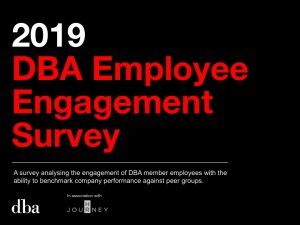Main Content

Employee engagement: Three steps to success
By Aliya Vigor-Robertson, co-founder, JourneyHR
The case for pursuing employee engagement is pretty clear-cut with research showing that disengaged employees cost their employers between £3,400 and £10,000 in wasted salary*. And yet, a lot of leaders have probably never conducted an engagement survey among their employees.
If you haven’t, the prospect may seem daunting, but it’s almost impossible to overstate the benefits that will accrue if you do.
After all, employee disengagement manifests itself in many ways, including absenteeism and poor job performance, both of which that can lead to short-term loss of revenue and long-term reputation damage. If a disengaged employee delivers under-par work or presents a poor attitude to a client, there’s a serious danger that the client will feel it’s not good enough, blame the agency, and decide to take their business elsewhere in the future.
But it’s not just underperforming employees who can cost you money. If they aren’t fully engaged, your best and most promising team members may feel they’re not experiencing the sort of career progression they are hoping for, and start to cast about for new opportunities elsewhere.
At JourneyHR we have recorded the number one reason employees leave organisations is a lack of recognition and purpose. The cost of replacing an employee is likely to be at least one-fifth of their salary if not more. So, if you’re not measuring employee performance and fixing the issues around disengagement, individual employees and the business overall will both start to stagnate.
If approached with the right mindset, there is nothing to fear from the results of an employee engagement survey and there are many benefits to be delivered if you do these three things:
1. Responding to feedback is essential
If you want to create a high performing organisation, responding positively to feedback is a critical skill. It’s vital to create a culture in which thoughts, opinions and ideas can be shared – from the bottom up, as well as peer to peer – in a way that is celebrated and recognised in order to help everyone grow and improve. So if you’ve never opened yourself up to an employee engagement survey before, make sure you are prepared to listen, understand and dig into the data.
Preserving anonymity is crucial here; otherwise employees may be cautious about taking part. As a leader, you must expect honesty in the feedback, and that can be painful at times. But don’t try to figure out which employee said what. It’s important to make this an exercise in identifying key themes and areas for growth. You cannot please everyone, but by sifting through the responses carefully, with a view to maximising employee engagement, you will begin to reap the rewards.
2. Change is a good thing - Embrace it!
If you decide to run an employee engagement survey, it’s important to focus on the results from a strategic perspective. For example, if employees are communicating that they don’t understand the overall vision for your business, or if they don’t feel communication is clear enough, take this as an opportunity to help you change.
In order to build a sustainable business, you need to ask questions – but if you don’t adapt in response to the answers, you might not survive. Think of it like evolution: businesses that stay the same generally tend to falter in the long run. So in order to be prepared for tomorrow, leaders need to adapt today.
3. Let your employees help you lead
As a leader running a business, the perception is that it’s your responsibility to drive it and make it better and yet, ideally, leadership should be a collaborative process. With an employee engagement survey you are allowing whoever participates to take ownership and remind themselves ‘I work in this business – what could I do better?’
As such, the results shouldn’t be seen as something that increases a leaders’ already over-burdened workload, or yours to bear alone to achieve positive change. By involving your employees in this process, you can delegate what action needs to be taken, which will encourage even greater engagement with the business and make it even more competitive in future.

About: Aliya Vigor-Robertson
Aliya started her HR career in 1996 and co-founded JourneyHR in 2010. Aliya works with Founders and business leaders in the creative industry and advises them on creating sustainable and creative cultures where their people can thrive and their businesses get great results.
Aliya is also a DBA Expert. Find out more about the DBA’s experts register and how our specialists could make a positive difference to your business here.
Employee Engagement Survey for DBA Members: Open for participation 6 to 20 September
 Employee engagement goes beyond simple job satisfaction. It combines commitment to the organisation and its values with a willingness to go the extra mile for colleagues.
Employee engagement goes beyond simple job satisfaction. It combines commitment to the organisation and its values with a willingness to go the extra mile for colleagues.
There is evidence to suggest that engaged employees are both more productive and more fulfilled than their less engaged counterparts. Engagement is therefore a key ingredient for organisational success and employee wellbeing.
Show your employees their voices are valued and heard by taking part in our Employee Engagement Survey, open 6-20 September 2019. The survey will quickly and effectively provide your organisation with employee insights, and your results will be put in context using benchmark scores based on DBA members. The detailed report of findings containing commentary, charts and analysis by subgroup (such as company type, employee age group and so on) will show how engaged your employees are, as well as their views on key topics such as leadership, communications, retention and line management.
Don’t miss out on this robust and cost-effective approach to employee engagement insights and benchmarking. Members will receive full details of how to take part from 6 September. If you have any questions please contact eleanor.singh@dba.org.uk | Eleanor Singh, Project Manager, DBA.
*Research by Gallup has shown that disengaged employees cost their employers between £3,400 and £10,000 in wasted salary and cost the overall economy £52-£70 billion a year. And the UK actually exhibits the worst figures in Europe when it comes to lost productivity.
Image credits:
Hermes Rivera | Unsplash
Aliya Vigor-Robertson | JourneyHR


 Employee engagement goes beyond simple job satisfaction. It combines commitment to the organisation and its values with a willingness to go the extra mile for colleagues.
Employee engagement goes beyond simple job satisfaction. It combines commitment to the organisation and its values with a willingness to go the extra mile for colleagues.